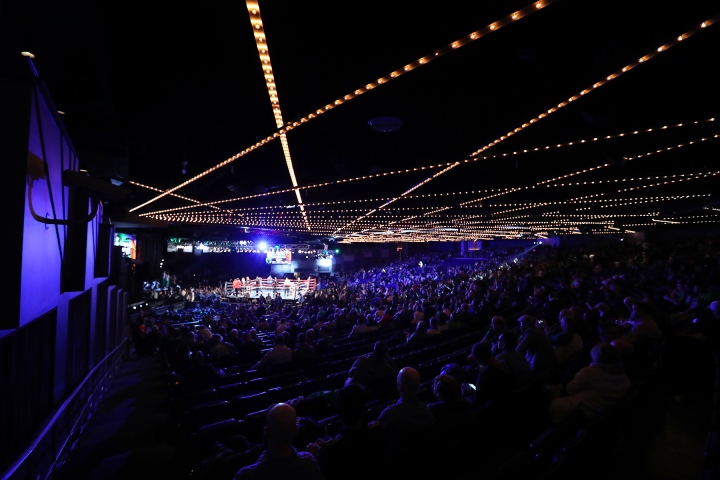by David P. Greisman
Eddie Chambers know he needs to fight — he fought just once in 2015 — and he knows that he needs a good win if he is to have any shot at contending again in the heavyweight division. But that chance hasn’t come yet, and he knows the reason for that as well.
“Four words, really: high risk, low reward. Simple as that,” Chambers told boxing reporters. “Guys look at me as enough of a threat to where, ‘Oh, he’s small. Maybe you’ll knock him out. Maybe you’ll hurt him Maybe you keep him where he can’t touch you, but what if he can, then he beats you or makes you look really bad?’ And then your stock drops because you just had a problem with a supposedly old — I’m only 33 — been-around-forever, beat-up-on heavyweight. And then there’s not enough money for these guys.”
Fortunately, in his eyes, that low-reward obstacle shouldn’t exist these days given his pool of potential opponents: heavyweights who, like him, are signed with powerful boxing adviser Al Haymon.
“The way these guys have been taken care of with Al Haymon, I don’t think that’s going to be an excuse if you’re a Haymon fighter,” Chambers said.
Chambers is aware that there are other routes for getting attention — he referenced Shannon Briggs’ antics — but that’s not him.
“I have a great personality and a certain swagger, calm confidence, but I don’t have that ‘I’ve got to be the center of attention’ type of attitude.’ I’m reserved. I don’t do these things. So to get all this attention, I got to win. I got to knock guys out or beat guys up or something, but in order to do that I got to get in the ring,” Chambers said. “I want to get in the ring and show these things off against good opponents. It’s difficult because they see those four words [high risk, low reward] I just said. If they do give me a shot I’ll be forever in their debt. But as of right no, for them it doesn’t make sense.”
Chambers was part of the International Boxing Federation’s four-man tournament to find a mandatory challenger to the heavyweight title back in 2007 and 2008. He bested Calvin Brock by split decision but went on to lose to Alexander Povetkin. After that he put together five straight victories, with a majority decision over Peter landing him a fight with Alexander Dimitrenko in an elimination bout. Chambers won that, also by majority decision, to get a fight with Wladimir Klitschko in early 2010.
Klitschko won by 12th-round knockout.
Chambers fought twice more at heavyweight, beating Derric Rossy in 2011 but losing to Tomasz Adamek in 2012, then decided to drop down to cruiserweight, where he lost to Thabisco Mchunu in 2013. He returned to heavyweight and fought in the United Kingdom for five fights after that, coming back to the United States last year for his win over Galen Brown.
The Philadelphian has now been a pro for 15 years. He is 42-4 with 23 KOs.
“The fact is I’ve put in a lot of work in my career, and it’s just not showing up,” he said. “Boxing has been great to me to a degree. I got great fans, great people I get to talk to, and get to go to different countries. But at the same time, what else has it really done? I don’t feel nothing in here now [he tapped his pocket] and my ranking, maybe I haven’t fought enough guys to get that ranking, but where’s the fights to get the ranking? Just gimme a couple fights. I’ll work for it. I don’t have a problem with that.
“Beggars can’t be choosers,” he soon added. “I’ll fight whoever they can put in front of me.”
Pick up a copy of David’s book, “Fighting Words: The Heart and Heartbreak of Boxing,” at http://bit.ly/fightingwordsamazon or internationally at http://bit.ly/fightingwordsworldwide. Send questions/comments via email at fightingwords1@gmail.com


ADD COMMENT VIEW COMMENTS (5)